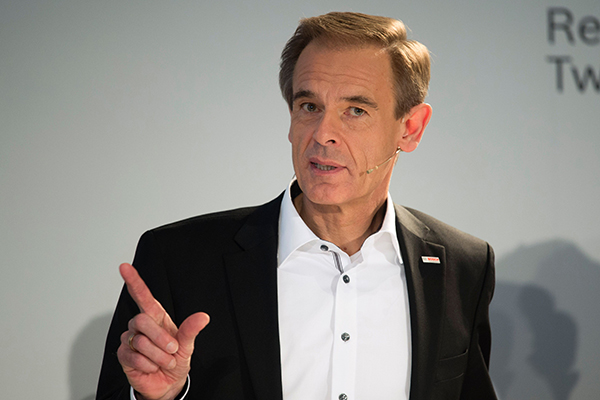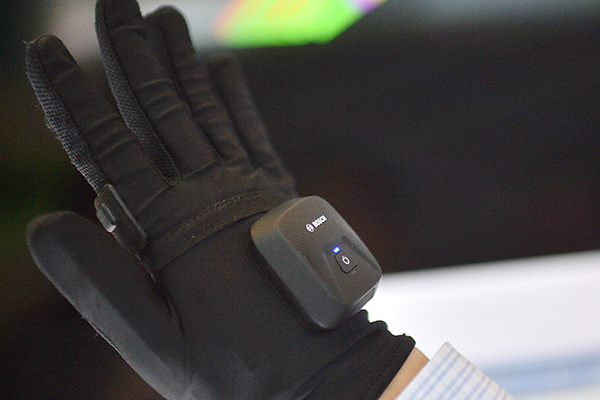 |
|
Volkmar Denner, chairman of the board of management of Robert Bosch GmbH. [Photo/Agencies] |
Bosch's Chinese team designs 'fascinating' products for both local and global markets, says its chairman
For many Chinese consumers, products with the trade-mark "Made in Germany" stand for solid and durable quality-and the Bosch brand fits right in with that reputation.
From the perspective of Volkmar Denner, chairman of the board of management of Robert Bosch GmbH, connectivity is an increasingly important factor to support German manufacturing business.
"We are driving this trend forward across all our business sectors. We can connect mobility with energy, building, and industrial technology to offer cross-domain services for our customers in both China and global markets," said Denner.
At Bosch's 250 plants throughout the world, the company currently runs more than 100 industry pilot projects under the German 4.0 industry plan.
It started the first Chinese industry 4.0 pilot project in Suzhou three years ago. Since then, Bosch has extended these pilot projects to plants in Shanghai, Wuxi, Changsha, Nanjing, Beijing, Changzhou and Xi'an.
"With the 'Made in China 2025' initiative, we expect the use of intelligent and connect-ed solutions in manufacturing to play an increasingly important role in China," said Denner.
Bosch's sales in China reached a record of 77 billion yuan ($11.5 billion) in its 2015 fiscal year and the company further invested in its foot-print there amid China's industrial upgrading boom.
Denner told China Daily about Bosch's corporate culture, its local business strategies and the secret of its success.
The following are edited excerpts from the interview:
How can Bosch's new research and development center in Germany benefit the Chinese market?
Our new research campus in Renningen reinforces the collaboration between corporate research and product development in our business divisions. The engineers in Renningen also cooperate strongly with R&D associates in our Research and Technology Center in Shanghai.
In this way, technologies can be utilized in China or localized for the Chinese market. And, innovations developed in Shanghai in the areas of inter-net of things, battery technology, and electric vehicles are also being shared in our global network. So our new research campus in Germany is part of a global network.
What are your business strategies as you readjust to the new realities in China, such as the New Normal and the Road and Belt Initiative?
Our strategy in China is based on innovation, localization, and new business mod-els.
First, localization: We have been active in China since 1909. Today, we have a strong presence and manufacturing base with more than 60 locations across the country. With some 55,000 associates, China is now Bosch's second-biggest workforce after Germany.
Second, innovation: Our strong investment in key innovation areas is another important strength. Globally, the Bosch Group invests around 9 percent of its total sales in R&D each year. In China, we now have more than 5,500 R&D associates at 22 technical centers.
Third, new business mod-els: We are putting emphasis on new innovative business models, and are redesigning our corporate culture.
 |
|
Bosch iGlove translates sign language to conventional language by recognizing details of finger movements. [Photo provided to China Daily] |
How do you assess the prospects of your business in China in conjunction with the Chinese market and economy?
China's growth has been impressive in the past. Today, it's the second-largest economy in the world, and the biggest exporting nation. Given the size of the market, we still view the relatively slower growth as considerable in absolute terms.
Despite the less dynamic market conditions last year, our business in China still developed positively, and we are confident that we will maintain this in the future. We are offering the right solutions tailored to the requirements of the Chinese market in all of the domains we are active in.
What is your biggest achievement in China as chairman?
There are many things that make me proud when I look at our success story in China. Of course this is never the achievement of a single per-son but always of a strong team.
Since 2012, our sales volume in the country has almost doubled and the contribution of China to the Bosch Group's global sales increased from around 10 percent to almost 16 percent. China is now the largest market for the Bosch Group outside Germany.
In addition, innovative competence is growing. It was therefore an important step to allocate more responsibility to researchers and developers in China.
Our airbag control unit tailored to the Chinese market, the mid-price T-edition power tools with specifications customized to the demand of Chinese consumers and the multi-function camera for cars calibrated according to Chinese traffic situations and driving behaviors, are only some examples of the innovative strength of our Chinese engineers.
And they are designing fascinating products not only for the local market, but also for the global markets. One example I would like to mention is our CB18 diesel pump which was developed in China, and is now being marketed in India, too.
What is the secret of your business success in China?
The success is attributable to the high degree of localization and our deep knowledge of the Chinese market.
This includes local manufacturing, product management, engineering, and a high share of local supply. And our success surely would not be possible without the in-depth expertise of our 55,000 associates in China.
What's an effective leader-ship for a company engaged in Chinese business?
We believe that local leader-ship is essential to better understand and react faster to the requirements of our customers in the Chinese market. Therefore, currently 86 per-cent of senior manager positions and 72 percent of director positions at Bosch in China are occupied by locally hired associates. We want to further increase these figures to 90 percent and 80 percent respectively.
How do you handle the hard-ships and setbacks, if any?
To answer this question, our research activities are a good example. It's our goal to tackle issues and challenges that involve a high degree of uncertainty, and where there is no guarantee of a successful out-come.
Often, these are the topics that have high commercial potential. That is why we have to create a research culture that allows our teams and researchers to fail once in a while, without it being cast in a negative light.
Failure itself is not bad, quite the contrary, it is part of every true innovation. What is important is that you learn from it, that you experiment and share the results with others. And then try something else.
We need to be more daring, to cooperate more across disciplines, and we need a new culture of dialog. This is some-thing we are driving forward within our company.
How do you get along with your local partners?
Today, Bosch supplies technologies and solutions for almost all automakers in the market, including new non-traditional automakers from the internet field.
We have also shared our experience in the areas of production, logistics, and company management with local suppliers.
One year ago we started a partnership with the National Development and Reform Commission to bring modern industry 4.0 technology to China in order to support the country in its ambition to transform industry towards innovation.
What do you think about the Chinese Dream? What are your dreams or ambitions in China?
Well, I would summarize the Chinese dream as an aim towards a more sustainable economy and industry, a greener environment, and a better life for Chinese people. Bosch can also contribute to this by providing innovative technologies and products in the future.
What are your hobbies? How do you spend your time off duty?
I try to keep a balance in my life, by spending time with my family and devoting time to my hobbies. I enjoy bicycle and motorcycle riding and I love to create things in my own work-shop. And I have to say that I really like testing our new products.
CV
Age: 59
Career:
2012 onwards: Chairman of the board of management, Robert Bosch GmbH
2006-12:Member of the board of management, Robert Bosch GmbH
2003-06: President, automotive electronics division
2000-03: Executive VP of sales and development, semiconductors and ECU division
1994-2000: Director of engine ECU development, director of sales, systems application, gasoline engine management division
1991-94: Department head in integrated circuit development
1989-91: Department head in power semiconductor technology development
1986-89: Power semiconductor development, semiconductors and ECU division
Education:
1982-85: PhD in physics at the University of Stuttgart
1975-81: Bachelor of Science; Master's degree in physics at the University of Stuttgart
Family:
Married with three children
